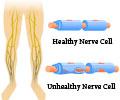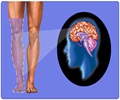Brain arousal compound noradrenaline plays critical role in sensory perception, the process of gathering and arranging information to understand events around us, claims a new study that finds that noradrenaline plays a vital role in earlier stages of perception.

‘Noradrenaline, a neurotransmitter responsible for arousal in the brain, plays a critical role in early sensory perceptions – the ability to perceive events around us.’





The research was jointly led by Dr. Hagar Gelbard-Sagiv and Efrat Magidov of TAU's Sackler Faculty of Medicine and Sagol School of Neuroscience, in collaboration with Dr. Haggai Sharon and Prof. Talma Hendler of TAU and the Sagol Brain Institute at Tel Aviv Medical Center. The scientists ran a series of experiments on 30 participants at the Sagol Brain Institute at Tel Aviv Medical Center. Subjects took part in three different sessions in which they received (1) drugs that lowered noradrenaline levels; (2) drugs that increased those levels; or (3) a placebo. After taking the medication, the participants were asked to perform visual tasks such as detecting and discriminating between low-contrast images, while the researchers measured their brain activity by EEG or fMRI. The researchers hoped to determine how various levels of noradrenaline affected visual perception and the way the brain responds to images.
"We determined that noradrenaline affected the participants' ability to detect low-contrast images. Even though the images were identical in each case, their visibility changed across sessions. We could predict whether the subjects could perceive those images by examining the levels of noradrenaline in their systems," says Dr. Gelbard-Sagiv.
"Our measurements of brain activity show that the first stages of visual processing are quite automatic, but late processing in the cerebral cortex is affected by noradrenaline and determines if an image will enter our stream of consciousness," adds Magidov.
"Many people suffer from difficulties in initiating and maintaining sleep," Dr. Nir concludes. "We hope to follow up on these results and test whether noradrenaline also determines if sensory stimuli such as sounds wake us up from sleep.
Advertisement
The research is published in Current Biology.
Advertisement









